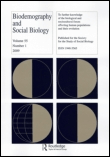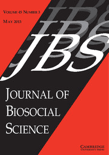
Biodemography and Social Biology
Scope & Guideline
Advancing Insights into Human Population Dynamics
Introduction
Aims and Scopes
- Demographic Analysis:
The journal emphasizes demographic studies, including fertility rates, mortality rates, and population projections, particularly in relation to social and economic factors. - Biological and Health Outcomes:
Research often explores the biological underpinnings of health issues, including genetic influences, inflammation, and aging, as they relate to demographic variables. - Social Determinants of Health:
There is a strong focus on how socio-economic status, education, and environment impact health behaviors and outcomes, underscoring the importance of social context in biological research. - Cultural Influences on Demography:
The journal investigates how cultural factors, such as ethnicity and community practices, affect demographic trends and health, particularly in indigenous and marginalized populations. - Interdisciplinary Approaches:
The journal encourages interdisciplinary research that combines insights from sociology, biology, anthropology, and public health to address complex demographic issues.
Trending and Emerging
- Impact of Climate Change on Demography:
Research exploring how climate change affects demographic variables, such as fertility and migration patterns, is gaining traction, reflecting the urgent need to understand these interactions. - Mental Health and Social Isolation:
There is an increasing focus on the intersection of mental health, social isolation, and biological outcomes, particularly in the context of the COVID-19 pandemic and its long-term effects. - Cultural and Socioeconomic Influences on Health Behaviors:
Studies examining how cultural beliefs and socioeconomic factors shape health behaviors, particularly in response to global health crises, are becoming more prominent. - Polygenic Risk and Health Outcomes:
The exploration of polygenic risk scores and their association with various health outcomes is emerging as a significant area of interest, linking genetics with demographic and social factors. - Intergenerational Transmission of Health Behaviors:
Research on how health behaviors and outcomes are transmitted across generations is trending, emphasizing the importance of familial and societal influences on individual health trajectories.
Declining or Waning
- Historical Demographic Studies:
Research focusing on historical demographic patterns, such as the impact of wars or historical events on population structures, has decreased, possibly as contemporary issues take precedence. - Traditional Biological Determinism:
Themes centered around traditional biological determinism, which emphasize genetic factors over environmental and social influences, appear to be waning, reflecting a broader shift towards more integrative approaches. - Single-Factor Analysis:
There is a noticeable reduction in studies that analyze health outcomes based on single demographic factors without considering the interplay of multiple social determinants. - Narrowly Focused Ethnic Studies:
While cultural influences remain relevant, studies that focus narrowly on specific ethnic groups without broader implications or comparisons are becoming less frequent. - Static Population Models:
The use of static models for demographic analysis is declining in favor of dynamic models that incorporate changes over time and account for various influencing factors.
Similar Journals

JOURNAL OF POPULATION RESEARCH
Fostering dialogue on pressing population issues.JOURNAL OF POPULATION RESEARCH, published by Springer, is a premier journal dedicated to advancing the field of demographic studies. With a focus on research that addresses the complexities of population dynamics, this journal serves as a vital platform for scholars, practitioners, and students alike. It holds a commendable Q2 ranking in the Demography category for 2023, underscoring its influence and commitment to quality research. The journal spans a rich convergence of knowledge from 2005 to 2024, covering key developments and emerging trends in population research. Although it operates under a traditional access model, its impact continues to resonate throughout the academic community, highlighting the importance of robust demographic analysis in policy and planning. By fostering insightful discussions and providing access to groundbreaking studies, the JOURNAL OF POPULATION RESEARCH remains an essential resource for those eager to deepen their understanding of population issues.

POPULATION RESEARCH AND POLICY REVIEW
Navigating the Complexities of Population DynamicsPopulation Research and Policy Review is a prestigious journal published by Springer, specializing in the fields of demography and policy analysis. Established in 1982, this journal has developed a significant reputation within the academic community, currently holding a Q1 ranking in Demography and a Q2 ranking in Management, Monitoring, Policy, and Law as of 2023. With a robust Scopus ranking of #34 out of 139 in Demography and a readership that spans multiple disciplines, this journal serves as a critical platform for researchers, professionals, and policymakers to disseminate their findings and insights related to population dynamics and policy implications. Although not an open-access journal, Population Research and Policy Review provides vital research that influences both theoretical frameworks and practical applications in social sciences and environmental management. The journal’s ongoing commitment to high-quality, peer-reviewed scholarship makes it an indispensable resource for those seeking to understand and address contemporary demographic challenges.

Revista Latinoamericana de Poblacion
Illuminating the Impact of Migration, Aging, and MoreRevista Latinoamericana de Poblacion is a distinguished open-access journal dedicated to the field of population studies, published by the Asociación Latinoamericana de Población. Since its inception in 2007, the journal has aimed to foster scholarly dialogue and disseminate critical research on demographic dynamics across Latin America. With an emphasis on diverse methodologies and interdisciplinary approaches, the journal serves as a platform for researchers, professionals, and students to engage with pressing issues such as migration, fertility, aging, and socio-economic factors influencing population trends. As an invaluable resource for the academic community, this journal not only promotes accessibility to vital research through its open-access model but also plays a crucial role in enhancing the understanding of demographic changes and their implications in the region. By focusing on the unique context of Latin America, Revista Latinoamericana de Poblacion facilitates a deeper insight into population phenomena that resonate globally.

Espaces-Populations-Societes
Connecting Spatial Analysis with Societal DevelopmentEspaces-Populations-Sociétés is a distinguished journal published by UNIV LILLE I SCI & TECH, focusing on the fields of demography and geography. Established in 1983, this open-access journal has committed itself to providing a platform for innovative research and discussions around population dynamics and spatial organization, with accessibility to its content available since 2004. Based in France, at the UFR Géographie & Aménagement, the journal plays a crucial role in advancing understanding of demographic trends and planning developments. With current Scopus rankings highlighting its position in the 25th and 14th percentiles for Demography and Geography, Planning and Development respectively, it maintains a reputable standing within academic circles, establishing its importance in contemporary research landscapes. Researchers, professionals, and students alike will find valuable insights in its comprehensive overview of sociocultural and environmental interactions, as well as place-based issues at the heart of societal development.

Economics & Human Biology
Advancing Knowledge at the Intersection of Health and EconomicsEconomics & Human Biology, published by Elsevier, is a prestigious journal that serves as an interdisciplinary platform at the intersection of economics and health sciences. With ISSN 1570-677X and E-ISSN 1873-6130, this journal analyzes the implications of economic factors on human health and biological outcomes. As a recognized leader in its field, it has earned a remarkable Q1 ranking in both the Economics, Econometrics and Finance (miscellaneous) and Health (social science) categories for 2023, reflecting its significant impact within the academic community, as evidenced by its Scopus rank of 88 out of 371 and a 76th percentile ranking in Health social sciences. Highlighting key issues such as health disparities, economic policy impacts on health, and the biological determinants of economic behavior, the journal encourages innovative research that bridges these critical domains. Researchers, professionals, and students seeking to contribute to or stay informed on emerging trends in health economics will find this journal an invaluable resource. Explore the latest findings and engage with a community dedicated to advancing our understanding of the interplay between economics and human biology.

Journal of Population Ageing
Fostering Dialogue on Ageing and SocietyThe Journal of Population Ageing, published by SPRINGER INT PUBL AG, stands as a prominent platform for the exploration and dissemination of research within the fields of demography, geography, and sociology. With an ISSN of 1874-7884 and an E-ISSN of 1874-7876, this journal navigates the complexities of population ageing, a vital topic as societies worldwide confront the implications of an ageing demographic. The journal boasts impressive Scopus rankings, including the 30th rank in Demography and a 78th percentile in Sociology and Political Science, emphasizing its significant role in academic discourse. It is highly regarded in its Q2 category quartiles for Demography, Geography, Planning and Development, and Sociology and Political Science, showcasing its relevance and scholarly impact. Although not an open-access publication, the journal's carefully curated articles aim to inform and advance knowledge, making it an invaluable resource for researchers, professionals, and students invested in understanding the multifaceted challenges associated with an ageing population. With its comprehensive scope and commitment to quality, the Journal of Population Ageing continues to contribute meaningfully to the evolving conversation on demographic trends and their societal implications.

ANNALS OF HUMAN BIOLOGY
Pioneering Research in Human Biology and Health SciencesANNALS OF HUMAN BIOLOGY is a distinguished academic journal published by Taylor & Francis Ltd that focuses on the intersection of human biology and health sciences. With an ISSN of 0301-4460 and an E-ISSN of 1464-5033, this journal has been a pivotal resource for researchers and practitioners since its inception in 1974. Covering critical domains such as Aging, Epidemiology, Genetics, Physiology, and Public Health, it exemplifies an interdisciplinary approach that enhances our understanding of human biological variation and its implications for health and disease. While it currently does not offer Open Access, the journal maintains a respectable standing in its field with notable rankings in Scopus, reflecting its contributions to scientific knowledge. Its commitment to high-quality research and comprehensive review makes it an essential platform for scholars, healthcare professionals, and students seeking to explore the biological underpinnings of human health.

Spatial Demography
Transforming Understanding of Demographic TrendsSpatial Demography is a vital academic journal published by Springer International Publishing AG, focusing on the intersection of spatial analysis and demographic research. With its ISSN 2364-2289 and E-ISSN 2164-7070, this journal aims to advance understanding of population dynamics through innovative methodologies and spatially explicit data, offering a platform for researchers, professionals, and students engaged in demography, geography, and urban studies. While it does not currently operate under an open access model, Spatial Demography maintains a rigorous peer-review process to ensure high-quality publications that contribute significantly to the field. Given the growing importance of spatial data in demographic research, the journal serves as an essential resource for those looking to explore how spatial attributes influence demographic processes and patterns worldwide. The official address of the publisher is Gewerbestrasse 11, Cham CH-6330, Switzerland.

JOURNAL OF BIOSOCIAL SCIENCE
Fostering Research at the Intersection of Health and SocietyJOURNAL OF BIOSOCIAL SCIENCE, published by Cambridge University Press, is a pivotal interdisciplinary journal dedicated to advancing our understanding of the complex interplay between biological and social factors in human health and society. With an ISSN of 0021-9320 and an E-ISSN of 1469-7599, this journal has been a cornerstone of scholarly communication since its inception in 1969, paving the way for innovative research until 2024 and beyond. The journal is ranked in the Q3 quartile in Public Health, Environmental and Occupational Health and Q2 in Social Sciences (miscellaneous), reflecting its significant impact in these fields. Its Scopus ranking further emphasizes its relevance, sitting at #79 out of 275 in General Social Sciences and #334 out of 665 in Public Health. Researchers, professionals, and students are encouraged to explore the journal's rich repository of articles that delve into critical biosocial issues, fostering a deeper understanding of how social structures influence health and well-being. Although not open access, the journal remains an essential resource for those committed to addressing contemporary health challenges through a biosocial lens.

POPULATION
Fostering Dialogue on Population Policy and TrendsPopulation, an esteemed journal published by the Institut National d'Études Démographiques (INED), serves as a critical platform for the dissemination of high-quality research in the field of demography. With the ISSN 0032-4663 (Print) and E-ISSN 1957-7966 (Online), this journal covers a wide spectrum of topics related to population studies, including migration, fertility, mortality, and population policy, offering a comprehensive lens on demographic trends that influence societies worldwide. Although it operates under a traditional subscription model, its rigorous peer-review process ensures that only the most impactful and relevant research findings are published. With its long-standing reputation among scholars and practitioners in the demographic domain, Population plays a vital role in shaping the academic discourse and guiding future research directions. Scholars, professionals, and students alike will find in its pages not only innovative perspectives but also critical insights that reflect the complexities of population dynamics in a rapidly changing world. For those dedicated to understanding the demographic challenges that societies face today, this journal remains an invaluable resource.